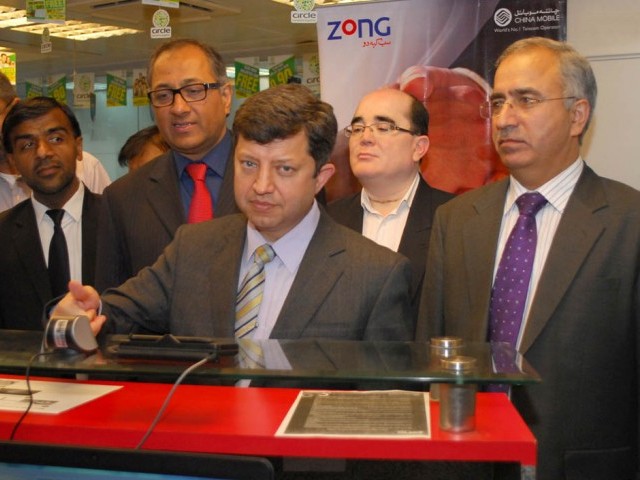KARACHI (MEDIA )
In a first practical step towards addressing the threat posed by unverified or unregistered SIMs – which, according to security agencies, are used in crimes and terrorist activities – China Mobile Pakistan launched the country’s first biometric verification system at one of its customer support centres here on Thursday.
Zong, the brand name for CM Pak, will install 30,000 biometric devices across Pakistan, Zong’s Chief Public Relations Officer Sikandar Naqi told the media. This would cost the company $5 million in terms of equipment expenses while there would be recurring cost as well, he said.
Starting from Karachi, he said the technology would be gradually introduced in all franchises and customer support centres of Zong across the country.
The development came in the wake of directives from the Pakistan Telecommunication Authority (PTA), asking all mobile operators to complete the deployment of biometric devices at their customer support centres and franchises in Karachi by November 30 and all over the country by December 20.
The launch of the biometric device for verification and issuance of new cellular SIMs coincides with the hearing of the Karachi violence suo motu case at the Supreme Court of Pakistan’s Karachi registry. The court, which also summoned the head of the telecom regulator and other officials to explain their progress in addressing the issue of unauthorised SIMs, will continue the hearing on Friday.
“This is the beginning of a system whereby the relationship between a SIM card and its owner would be clear,” PTA Chairman Syed Ismail Shah said at the launch ceremony. This would ensure that the buyer of a new SIM and the person against whose name it is issued are the same, he said.
Shah, who was in the city in response to SC’s notice in the Karachi violence case, was flooded with questions about unverified SIMs, the upcoming spectrum auction and unblocking of social video-sharing website Youtube.
With the prevailing law and order situation in Karachi, in fact the country, this kind of mechanism was inevitable, he said. The new system might not completely stop the crime, but it would certainly reduce it by restricting the use of unauthorised SIMs, he said.
The system can verify the number of SIMs registered against a CNIC number, complying with the regulation that limits it to a maximum five SIMs against one identity card.
Under the system, customers would be required to visit the mobile operator’s customer support centre or franchise where the device is deployed and provide his finger prints. This biometric information would be verified from the National Database and Registration Authority (NADRA)’s database – a process that will take about 15 seconds.
If the information matches the customer’s CNIC data at NADRA, his SIM will be activated.
Asked about any possible loopholes, Naqi said, “We have developed an SOP for the biometric verification system and tried to make it as foolproof as possible.”
SIM verification mechanisms were first introduced in 2007-08, according to Zong. Initially, all SIMs were verified by NADRA through an offline channel. In 2009, a new method was introduced where customers would activate their SIMs by dialing 789 to verify their record from NADRA. From 2009 to 2012, a text-based SIM verification process was introduced in four different phases.
However, none of these measures helped the regulator overcome the problem of unregistered SIMs. Hence, the PTA is now encouraging the telecom operators to start installing biometric devices with a foolproof system.
While it is certainly the first biometric verification system launched by a telecom firm in Pakistan, the PTA claims it is the first of its kind in the world.
“Our studies show that this is the first biometric verification system for SIM registration in the world,” PTA DG Enforcement Abdul Samad said. “We have launched it, the countries facing similar problems may follow this model.”
Published in The Express Tribune, November 29th, 2013.

